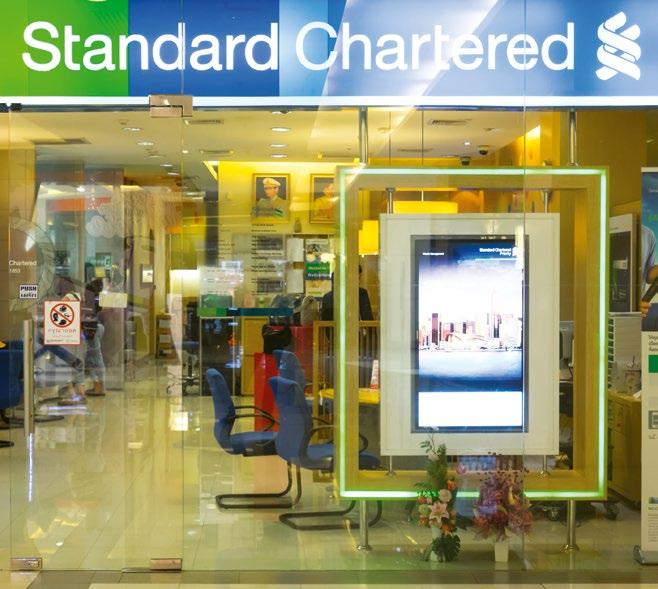
6 minute read
The Purpose of Brands Beyond 2020
The Purpose of Brands Beyond 2020 Ninth Space is a brand strategy and design company with a mission to build brands with purpose – brands that have a positive influence on our world. As a new decade starts, the Retail People Magazine speaks with Habib Beaini, Managing Director of Ninth Space, who shares his insights on what we can predict for the role of brands. How will they find their purpose in a world of hyper-aware, conscious individuals that expect positive contributions to the advancement of society and action that cares for our planet?
As we move into a new decade we can see many predictions for the future of retail, and chief amongst these global trends is AI and big data – using data to drive better brand experiences, loyalty, value, and market growth. Accurate predictions allow for great efficiency in getting the right product and service to those who want it most. This means that brands are more relevant to and resonate better with their consumers. However, trust, privacy, and data protection are already becoming major influencing factors for many consumers.
Advertisement

their communities. There are warning signs, however, in terms of the ROI of some of these retailtainment installations; many may draw large crowds, but the conversion into retail sales isn’t clear. Neither is their longevity; technology advances can render them obsolete quicker than anticipated.
Convergence between the real world and online worlds is becoming progressively less segmented; retailers mix all mediums to create more enhanced, customized, and direct experiences. The advent of mixed reality now takes advantage of technology that enables users to touch and feel a real product, yet experience it in an augmented world (sitting in a car in the showroom whilst experiencing it on a racetrack), taking the purchasing experience to a whole new level. With the ability to co-design products, people will also be able to develop their own individual versions.
Dubai Fountain at Dubai Mall attracts crowds from all over the world. A great example of successful retailtainment.
Amazon Go brings together the convenience of online shopping with supermarket pickup.

Retailtainment is another massive buzzword. Enhanced technology, real participation, events, and customization are how brands are resonating with their audiences through brand activation programs. Malls are able to program their spaces and collaborate with retailers to become more vibrant hubs for

5G technology will be a game-changer over the next few years, allowing brands to create an array of valuable and exciting opportunities. Faster data speeds and the cheap cost of data will enable brands to connect technology and people in more meaningful and effective ways.
However, all these are tactical tools used to enhance the shopping experience. Without a doubt, they will help create more engaging, personalized, and augmented methods that consumers can enjoy, yet none of them will address the real challenges brands will face over the next decade.
We live in an age of hyper-awareness, and this acute awareness of our role in the world, its ecology, economies, societies, and cultures have changed the way we think, act, and how we imagine the world we live in.
Today, people know the effects of their purchases on other people and the world’s resources that are evolving the idea of capitalism. Growth for profit will fade as people’s expectations for more personally and socially meaningful products and

Hyper-aware and conscious people speak out about their causes.
services increase. People will no longer be content that their purchases aren’t having a negative effect on the world; they’ll want to see their purchases actually having a positive effect, socially and environmentally.
Brands have long realized that it’s not only about selling great products or services, and while customer experiences and brand purposes are essential, neither are enough. The whole e-commerce ecosystem is now a given; whether P2P, social or direct, these channels are no longer major advantages. Being environmentally and socially aware is part of the table stakes of any global brand, but it is just a requirement. Individualization is great for more personal expressions, but mass-customization is now easy for most international retailers. Brand activation is expected at all retail touch points.
We are moving into an era of brand activism, the implications of which are fundamental to the role of retail in tomorrow’s world. A meaningful response to activism is an unwavering responsibility of the brands of tomorrow. If the cause is environmentalism, then the development of products made from recycled ocean plastics is not enough. Investment in cleaning the oceans, funding the development of more efficient recycling technologies, and vetoing environmentally unfriendly suppliers is what brand activism is all about.
People expect brands to behave responsibly anyway, but now they expect them to contribute positively and tangibly, otherwise, they won’t buy their products or services. The real value and equity in brands will no longer be in the quality or innovation of their products, nor in the efficiency or professionalism of their service, and not even in the manner in which they inspire their customers; it will be how they create positive change socially and environmentally – how they help improve people’s lives and improve the quality of life on Earth.
Why we shop where we shop will have a completely different meaning. We will still want good quality products but created by brands that make the world a better place. We will still want the convenience of shopping online, but not at the cost of trip generation on the environment. We will still want to be entertained, but not at the cost of anything that will cause a negative effect on the world. Retailers and mall operators in the Middle East will eventually need to embrace these global shifts, and the sooner they change their business models to capitalize and contribute, the sooner they’ll take a leading role in the economy of the next decade. How shopping malls reconfigure their policies, properties, and services to ensure they’re preparing themselves for this new era will be fundamental to their success. How retailers reconfigure their approach to product development and services to local markets will allow them to become more valuable participants. How mall operators and retailers collaborate to create a more inclusive or holistic approach to new consumer expectations will create the new thriving retail hubs of this new era.
Brands with long-term policies that ensure care for our planet, its people, and the causes that are important to them will become winners. Those that do not will quickly lose loyal customers and, eventually, their credibility.
International retail bank Standard Chartered announcement that they have stopped investing in coal-fired power stations as a key part of their mission “Here for good”. This now dedicates that the bank will only provide financial services to clients who manage their environmental and social impacts responsibly.


Habib Beaini, Managing Director of Ninth Space (a highly specialised brand and design consultancy) and a Fellow of the Chartered Institute of Marketing, is a brand expert with over 25 years of experience helping organisations to grow their business internationally into successful, impactful and valuable brands.










